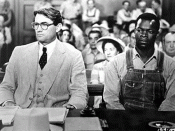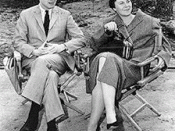Many consider the southern "ideal" as consisting of stunning manor houses, the breathtaking panorama, and the posh populace; however, this ideal has been severely tarnished due to slavery. Harper Lee's To Kill a Mockingbird gives profound insight into the daily lives of citizens occupying a small-town, Maycomb, in the heart of the Deep South. By means of the many distinctive characters, their pre-Civil Rights Movement attitudes are scrutinized by a young girl, Jean-Louise Finch (Scout Finch), and are put into the limelight through the eyes of an innocent. In the novel, To Kill a Mockingbird, Harper Lee utilizes the effects of hypocrisy, symbolism, and irony to criticize a variety of elements in Southern life such as small town provincialism, the defunct educational system, and injustice.
Groundless intolerance, undoubtedly one of the main key concepts of To Kill a Mockingbird, is a large element in which Harper Lee employs the effects of hypocrisy.
"He ain't company, Cal, he's just a Cunningham--" (Pg. 24); this is one of the first times in which Scout Finch encounters groundless discrimination, and sadly, she fails to recognize it. When one is invited to one's house, one should be considered company; however, Scout redefines company as people who are more important than a "Cunningham." Although she is at a rather young age, she already regards people as socially inferior due to the fact that her father is one of the few professionals in the town. Although, the depression greatly decreases the income for many citizens, Atticus possess the respect of the town, and of many higher officials due to his occupation as a lawyer. Scout picks up on this advantage over other inhabitants in Maycomb, and uses this to discriminate against others who are less privileged than her. Another illustration of hypocrisy in Southern...


